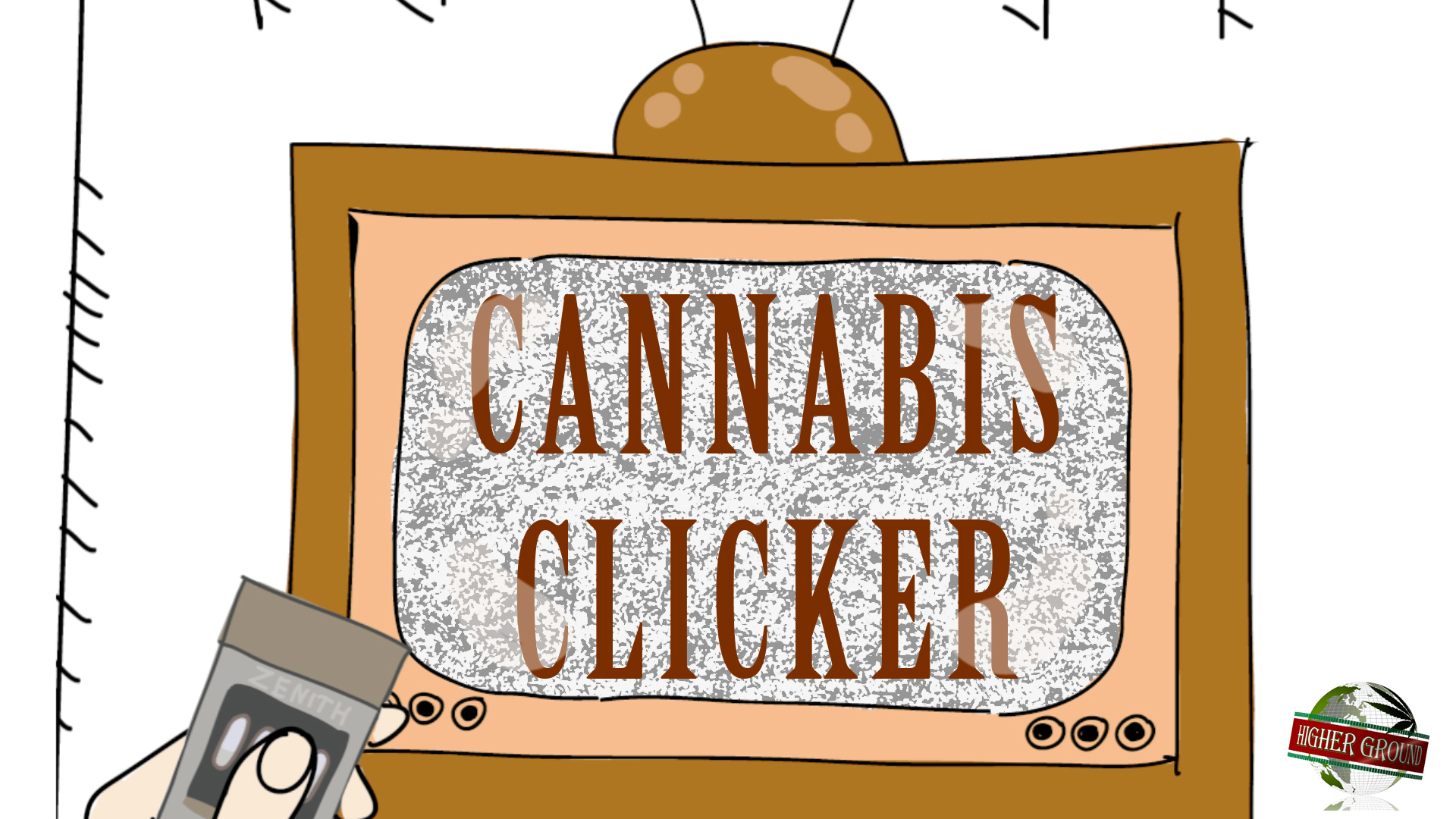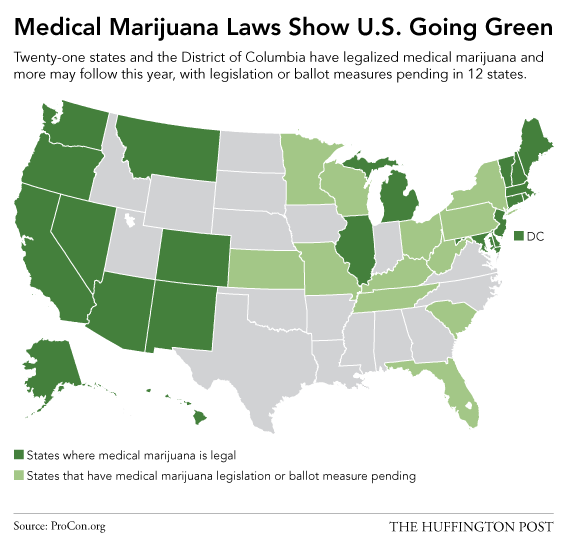Look – fair is fair. Even if you’re on parole. Washington State has legalized marijuana, and that means recent parolees can fire up as soon as they hit the streets. Is that a good idea? Probably not.
Report by CHRIS INGALLS / KING 5 News
About the Author
Michael is a journalist and filmmaker. His award-winning documentary, Sleeping with Siri is playing film festivals across the country. Stusser runs TechTimeout campaigns in high schools across the country, asking teenagers to give up their digital devices (for a little while) in order to find balance, and perhaps even make eye-contact with their parents.You Might also like
-
Higher Ground Creates World’s First Pro-Cannabis Ad
Higher Ground has created a new ad to support legalization reform efforts across the country. “Cannabis Clicker” will air in the five States with recreational legalization ballots: California, Maine, Nevada, Arizona and Massachusetts. The ad will also run in States with medical marijuana votes – including Oklahoma, Florida, Arkansas, North Dakota and Montana. All told, nine states will be voting on ballot initiatives related to legalizing and regulating cannabis on November 8th.
“We wanted to use the old reefer madness propaganda as part of our ad,” noted Editor-in-Chief Michael A. Stusser, “and juxtapose it with what’s really going on.” The ad, titled “Cannabis Clicker,” shows side-by-side living rooms, one playing anti-drug commercials and films from a now by-gone era, while the set in the modern living room plays news stories about legalization from the past few years. “Sometimes it’s best just to let the story tell itself,” Stusser notes. “Teen drug use has actually gone down since legalization, massive taxes have been raised, there has been no increase in traffic fatalities – and the sky has not fallen.”
The Cannabis Clicker ad uses clips from the original Reefer Madness movie, the infamous “Your Brain on Drugs” PSA, as well as modern day news clips featuring studies and research related to the legalization of marijuana.
Based out of Seattle, where recreational marijuana was legalized in 2012, Higher Ground is attempting to “Elevate the Dialogue” and broaden the movement nationally. While legal in Washington, Colorado, Alaska and Oregon, the use, sale or distribution of cannabis is still a felony at the federal level, and over 700,000 Americans are arrested every year for marijuana-related offenses. The parody ad has been provided to all the pro-legalization campaigns, and is being used both on social media (Facebook, Twitter, Instagram and VIMEO) as well as paid television in selected markets in California and Nevada.
-
IN LEGALIZING IT FOR THE MASSES, WE SEEMED TO HAVE SCREWED THE MEDICAL MARIJUANA PEEPS
The lazy-ass staff at Higher Ground would like to thank Steve Elliot and the Seattle Weekly for their excellent coverage of the ongoing trials and tribulations regarding the legalization of marijuana in Washington State. Steve Elliott edits Toke Signals, tokesignals.com, an irreverent, independent blog of cannabis news, views, and information.
-
Here’s the Weed Law In Every Damn Legal State
Alaska
Law: Measure 2 (52.15%)
Year Passed: 2014
Date Implemented: February 24th, 2015
Age Requirement: 21
Administrative Agency: Marijuana Control Board
Tax Structure: $50 per ounce on all marijuana sold by wholesale cultivation facilities, additional local taxes expected
Recreational Outlets: No, expected to open Spring 2016
Possession Limit: 1 oz, and all marijuana from a grow, at the location of that grow
Home Cultivation: 6 plants, with only 3 in flowering stage at a time
Transport: 1 oz.Colorado
Law: Amendment 64 (55.3%)
Year Passed: 2012
Date Implemented: January 1st, 2014
Age Requirement: 21
Administrative Agency: Department of Revenue, Marijuana Enforcement Division (MED)
Tax Structure: 15% on grower, 10% special sales tax, 2.9% standard sales tax, additional local taxes may apply
Recreational Retail Outlets: Yes
Possession Limit: 1 oz, non-residents of Colorado 0.25 oz
Home Cultivation: 6 plants, with only 3 in flowering stage at a time
Transport: 1 oz, open container law appliesOregon
Law: Measure 91 (56.1%)
Year Passed: 2014
Date Implemented: July 1st, 2015
Age Requirement: 21
Administrative Agency: Oregon Liquor Control Commission
Tax Structure: 17% sales tax
Recreational Retail Outlets: MMJ dispensaries to begin selling recreational October 2015 via Senate Bill 460. Possession Limit: 8 oz at home, 1 oz outside, 1 lb solid edibles, 72 oz liquid, 1 oz extract (concentrates)
Home Cultivation: 4 plants
Transport: 1 oz within state lines, Non-flowering plantsWashington
Law: Initiative 502 (55.7%)
Year Passed: 2012
Date Implemented: July 8th, 2014
Age Requirement: 21
Administrative Agency: Washington State Liquor Control Board
Tax Structure: 25% at all stages, grower, processer, retailer and customer, plus normal sales taxes
Recreational Retail Outlets: Yes
Possession Limit: 1 oz marijuana, 16 oz of marijuana-infused products in edible form, and 72 oz of marijuana products in liquid form
Home Cultivation: No
Transport: 1 ozWashington D.C. (formally District of Columbia)
Law: Initiative 71 (64.8%)
Year Passed: 2014
Date Implemented: February 26, 2015
Age Requirement: 21
Administrative Agency: None
Tax Structure: None, retail & sale is still illegal
Recreational Retail Outlets: No
Possession Limit: 2 oz
Home Cultivation: 6 plants, with only 3 in flowering stage at a time
Transport: 2 oz
Alaska
Law: Measure 2 (52.15%)
Year Passed: 2014
Date Implemented: February 24th, 2015
Age Requirement: 21
Administrative Agency: Marijuana Control Board
Tax Structure: $50 per ounce on all marijuana sold by wholesale cultivation facilities, additional local taxes expected
Recreational Outlets: No, expected to open Spring 2016
Possession Limit: 1 oz, and all marijuana from a grow, at the location of that grow
Home Cultivation: 6 plants, with only 3 in flowering stage at a time
Transport: 1 oz.Colorado
Law: Amendment 64 (55.3%)
Year Passed: 2012
Date Implemented: January 1st, 2014
Age Requirement: 21
Administrative Agency: Department of Revenue, Marijuana Enforcement Division (MED)
Tax Structure: 15% on grower, 10% special sales tax, 2.9% standard sales tax, additional local taxes may apply
Recreational Retail Outlets: Yes
Possession Limit: 1 oz, non-residents of Colorado 0.25 oz
Home Cultivation: 6 plants, with only 3 in flowering stage at a time
Transport: 1 oz, open container law appliesOregon
Law: Measure 91 (56.1%)
Year Passed: 2014
Date Implemented: July 1st, 2015
Age Requirement: 21
Administrative Agency: Oregon Liquor Control Commission
Tax Structure: 17% sales tax
Recreational Retail Outlets: No; Still illegal to buy or sell. Outlets expected 2016 – MMJ dispensaries may begin selling recreational October 2015 if Senate Bill 460 is signed into law.
Possession Limit: 8 oz at home, 1 oz outside, 1 lb solid edibles, 72 oz liquid, 1 oz extract (concentrates)
Home Cultivation: 4 plants
Transport: 1 oz within state lines, Non-flowering plantsWashington
Law: Initiative 502 (55.7%)
Year Passed: 2012
Date Implemented: July 8th, 2014
Age Requirement: 21
Administrative Agency: Washington State Liquor Control Board
Tax Structure: 25% at all stages, grower, processer, retailer and customer, plus normal sales taxes
Recreational Retail Outlets: Yes
Possession Limit: 1 oz marijuana, 16 oz of marijuana-infused products in edible form, and 72 oz of marijuana products in liquid form
Home Cultivation: No
Transport: 1 ozWashington D.C. (formally District of Columbia)
Law: Initiative 71 (64.8%)
Year Passed: 2014
Date Implemented: February 26, 2015
Age Requirement: 21
Administrative Agency: None
Tax Structure: None, retail & sale is still illegal
Recreational Retail Outlets: No
Possession Limit: 2 oz
Home Cultivation: 6 plants, with only 3 in flowering stage at a time
Transport: 2 ozThanks to Smoker’s Guide for their in-depth research.





